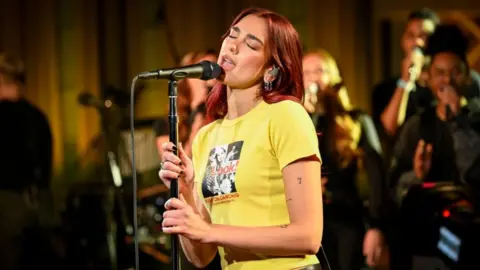In a rapidly evolving technological landscape, prominent British musicians, including Elton John and Dua Lipa, are raising alarms about the potential threats posed by artificial intelligence (AI) to creative industries. These stars, along with over 400 fellow artists, writers, and performers, have taken a stand by sending a poignant letter addressed to Sir Keir Starmer, the leader of the UK Labour Party. The letter articulates their urgent calls for updating copyright laws to safeguard their intellectual property against the encroaching capabilities of AI.
The letter underscores a critical concern: a failure to revise current copyright policies could lead to artists unwittingly relinquishing their work to technology companies without adequate compensation. Within this context, the letter emphasizes the significance of maintaining the UK’s stature as a global creative powerhouse, which is at risk if protective measures are not enacted. Musicians and artists argue that transparency in how AI developers utilize their works is imperative to ensure fair practices within this burgeoning sector.
The musicians are advocating specifically for an amendment to the Data (Use and Access) Bill, which would necessitate developers to inform copyright holders regarding the use of their material for training AI models. This push for transparency is rooted in concerns that the AI development process, which often employs copyrighted material, could undermine the very fabric of creative culture in the UK.
Response to this movement has been mixed. A government spokesperson has expressed a commitment to ensuring that the creative sector and AI companies can thrive together, asserting that any changes to copyright laws will only be considered if they are satisfactory to creators. The spokesperson noted that the government is currently consulting on a series of measures aimed at balancing the interests of both industries.
Signatories of the letter extend beyond music icons such as Kate Bush, Robbie Williams, and Coldplay to notable writers like Kazuo Ishiguro and David Hare, signaling widespread concern across various creative fields. Sir Paul McCartney has also joined the chorus of voices advocating for artists’ rights. Collectively, they acknowledge their critical roles as wealth creators and custodians of cultural narratives, highlighting that AI’s reliance on human creativity must be recognized and respected.
Moreover, the artists emphasize that their concerns can be addressed if the government supports an amendment put forth by Baroness Beeban Kidron. This proposed amendment aims to facilitate the establishment of licensing regimes that would benefit both AI developers and content creators alike.
However, not all stakeholders share this perspective. Julia Willemyns, a co-founder of the Centre for British Progress, has argued that the artists’ proposals could inadvertently stifle innovation and hinder the UK’s growth potential in the tech sector. She cautions that stringent copyright regulations may push AI development offshore, thereby diminishing domestic innovation and adversely affecting the overall economy.
Despite these dissenting opinions, the urgency of the issue remains evident. Artists have increasingly voiced their frustrations regarding their works being utilized to develop generative AI systems without consent. This concern has led some, including Annie Lennox and Damon Albarn, to protest government proposals by releasing a “silent album” to spotlight the gravity of the situation.
The UK government’s consultation process around copyright law reform has entered a critical phase, particularly as backlash from creators mounts. Observations by key figures, such as Ishiguro, reflect a desire for fairer schemes that prioritize the rights and livelihoods of individual artists over corporate interests.
In the backdrop of these developments, Baroness Kidron’s push for transparency in AI governance is seen as essential to foster a vibrant licensing market that could benefit all parties involved. The government, for its part, assures ongoing evaluations of its consultation process and future steps, hinting at a commitment to navigating the delicate balance between fostering innovation and protecting creators’ rights.
As the landscape of AI continues to transform creative industries, the way forward remains contentious, with ongoing debates highlighting the need for careful consideration of the implications of technology on artistic expression and intellectual property rights.



